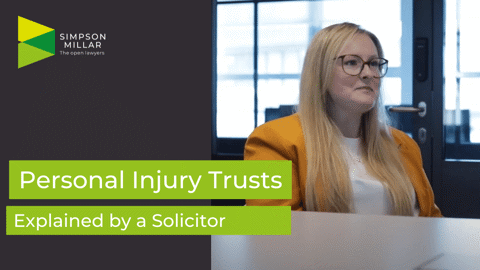
Melanie Varey
Partner, Head of Court of Protection
We can give you help, advice and set up of a Personal Injury Trust.


When you make a Personal Injury or Medical Negligence claim, you’ll get a pay out of compensation when your claim settles. If you are already claiming means tested state benefits, or your injuries are life changing and you may need to claim benefits in the future, your settlement could mean that you are no longer eligible.
When you make a Personal Injury Trust, your settlement is not included in any means testing for state benefits.
You’ll choose Trustees, who will look after the Trust and manage it for you.
Your Personal Injury Solicitor should talk to you about whether you should set up a Personal Injury Trust before you settle your claim. Our experienced Personal Injury Trust Lawyers can help you get this set up quickly and efficiently.
If you want to talk to one of our expert Solicitors, get in touch today.



A Personal Injury Trust can help protect any current or future means tested benefits after you get a compensation payment because of a Personal Injury or Medical Negligence claim. Some of the means tested benefits include:
If you have more than £6,000 in savings your benefits could be reduced and any more than £16,000 in savings could stop your benefits entirely, so you can see why a Personal Injury Trust is so important.
Simpson Millar5 stars
Pete Myers
Pete Myers, a Senior Paralegal – Court of Protection - at Simpson and Millar, was outstanding from start to finish! Pete flawlessly established my Personal Injury Trust Deed and also arranged the set...
Ian McMonagle
Simpson Millar5 stars
Fern Crabtree was professional
Fern Crabtree was professional, curtious and would always be available to answer any of our questions. Fern also warned us up front that we may not achieve our objective and asked us if we still wante...
Dawn Hall
Simpson Millar5 stars
Excellent service throughout
Excellent service throughout. Applied for Health & Welfare deputyship for my disabled son. Alice Hellewell was always quick to answer any questions and sent through paperwork with full instructions at...
Sharon Vaissiere
Simpson Millar5 stars
Thank you to all the staff of Simpson…
Thank you to all the staff of Simpson Millar Solicitor especially to Ma’am Sarah Collier who did her best by helping me during my difficult time. She was very thorough and efficient in dealing Emmy si...
Mercy
Simpson Millar5 stars
Successful 21a challenge
I was involved in a 21a challenge on behalf of my client and Caroline Hurst from Simpson Millar represented him. My client was very unhappy in the environment he was living in. Caroline listened car...
Heather Lynn Pearson
Simpson Millar5 stars
DoLS RPR experience of 21A Challenge
I instructed Simpson Millar for a 21A challenge of the DoLS. This was a complex case where my client was in distress and objecting to living in the care home where they resided. Caroline Hurst, Solici...
A DoLS RPR
Simpson Millar5 stars
Hi my name is Musa Yasin
Hi my name is Musa Yasin, I had a very professional And Higher standard solicitor called (Verity Altaras) 1- she helped me to get priority needs as a care leaver when it was very impossible for any o...
Musa
The rules state that the first payment you get after a Personal Injury is disregarded for an entitlement assessment for 52 weeks and this includes any interim payments you get.
It’s always best to have the Personal Injury Trust set up before you get any payments of compensation so that it is disregarded from any eligibility assessments right from the start.
Click Here to Download More Information about Our Personal Injury Trusts
These are the people who will manage the Trust for you and it’s really important that you trust them completely.
You can have a minimum of 2 Trustees and a maximum of 4, and you’ll be one of them. As Trustees, you and the others must accept the terms of the Trust Document and carry out those terms within the law, for your benefit.
Once you’ve chosen your Trustees, a Personal Injury Trust Solicitor will make an appointment with you, usually on the phone. We can visit you at home, but there is a small charge.
The Solicitor will talk through your needs and wishes at the meeting and then create the Trust Document, which will be signed by you and the other Trustees.
You’ll need to set up a Trustee Bank Account – you can do this by asking a Financial Advisor to help you or contacting your local bank. We can recommend a Financial Advisor if you want us to.
We can tell the Benefits Agency about the trust for you, but you’ll need to give us your National Insurance Number and the address of your Benefits Agency.

Specialist Trust Solicitor Kayleigh Smith talks through what a personal injury trust is, how to set one up and why you should look at this.
It’s difficult to protect your settlement from a divorce or from bankruptcy.
You could consider a pre-nuptial or post-nuptial agreement to try to protect your settlement if you get divorced. Whilst the Court now does give these agreement some weight, the needs of the children and less financially secure person will be considered.
But if your Trust is there to help provide for your future care after a serious injury, the Court will consider this carefully in any future disputes.
It will cost from £900 (VAT Included) depending on how complex the Trust is and whether you need a home visit.
Your Personal Injury Solicitor can ask the defendant to include these set up costs in your Personal Injury settlement, along with any associated running costs. These costs will be paid for by them for the life of the Trust.
If you don’t spend the money, it simply stays in the Trustee Bank Account. You may want to talk to a Financial Advisor about any investments and how to manage it in the most tax efficient way.
You can spend the money for anything you want as long as the Trustees agree to sign the withdrawal form or the cheque.
You can’t make regular payments to yourself though, as this could be classed as income. Remember, any amount over £6,000 that you have in your personal bank account could affect your benefits.
All of the money, and any interest belongs to you. You don’t have to formally register the Trust with HM Revenue and Customs, but you should contact them at the end of each tax year to see if you need to submit a self-assessment tax form.
Because we set up a ‘Bare Trust’ there is no need for the Trustees to complete an Income Tax Return. There may be a tax rebate available for Trustees, as the Trust is tax efficient. You should talk to HMRC or your Financial Advisor.
If your Trust is not a Bare Trust, we will tell you as there may be tax implications.
You can remove Trustees if you don’t think that they are using the money for your benefit or acting in your best interests.
A common disagreement is not being given permission to have money at a certain time, but there may be a good reason for this. It’s always worth talking things through with the Trustees to see if you can resolve the issues rather than removing them.
Yes. You can unwind the Trust if your circumstances change, and you don’t need it anymore.
Fill in the form below to get in touch with one of our dedicated team members, or call our team today on: 0808 239 9764